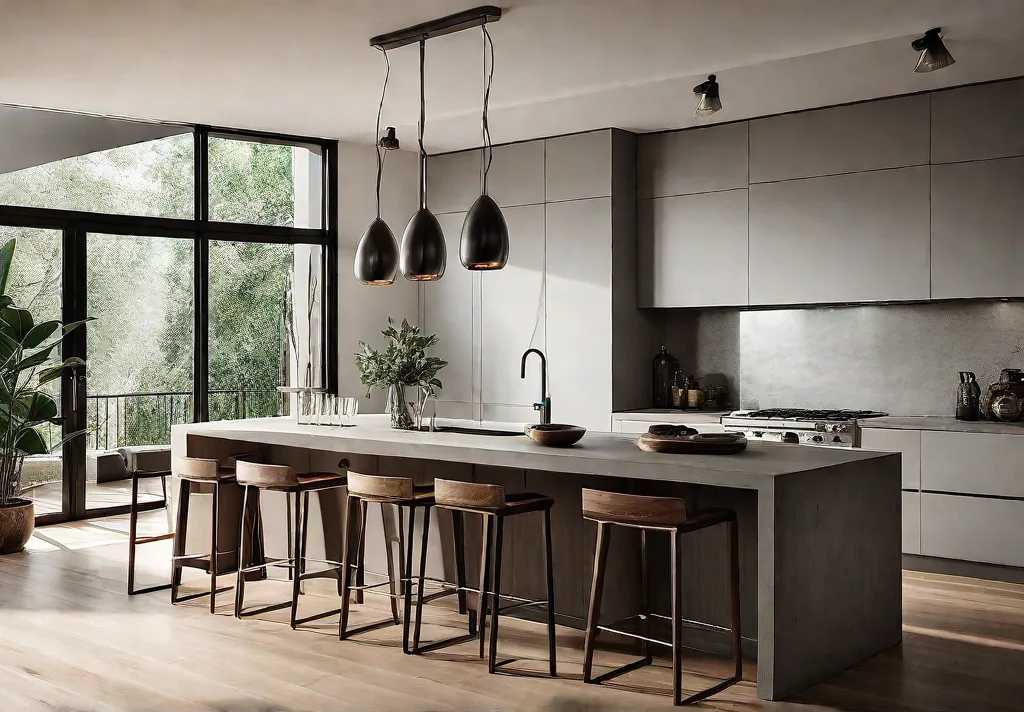Have you ever walked through a home improvement store, staring at row after row of kitchen countertop samples, feeling overwhelmed by the options? I know the feeling! As a landscape architect and home and garden expert, I've seen my fair share of kitchen renovations. And let me tell you, the traditional choices of granite, quartz, and marble are just the tip of the iceberg when creating a beautiful and functional kitchen.
A recent survey found that 50% of homeowners would choose a different material if they renovate their kitchen again. I'm excited to share five unique kitchen countertop materials you may not have considered but should! These options offer a range of benefits, from sustainability and customization to durability and timeless style. Whether you are planning a full kitchen overhaul or refreshing your countertops, these alternatives could be the perfect fit for your home.
Concrete Countertops
Let's start with concrete countertops. These versatile surfaces are becoming increasingly popular in modern kitchens, and for good reason. Concrete offers a unique, industrial-chic look that can be customized to fit any design style.

What makes concrete countertops so special? For starters, they are incredibly durable and can withstand heavy use without showing signs of wear. Plus, they can be polished, stained, or even embedded with decorative elements like glass or metal to create a truly one-of-a-kind look. And the best part? Concrete countertops can be made with recycled materials, making them eco-friendly.
I know what you might be thinking - concrete sounds a bit rough and utilitarian. But trust me, today's concrete countertops are anything but basic. They can be designed to mimic the look of natural stone, like marble or granite, at a fraction of the cost. And they're heat and scratch-resistant, making them a practical choice for busy kitchens.

Concrete countertops require regular cleaning and sealing to maintain their appearance. But with the right maintenance, they can last for years and add a unique, customizable element to your kitchen design.
Soapstone Countertops
Another material that often goes unnoticed is soapstone. This natural stone has been used in kitchens for centuries, and for good reason. Soapstone is incredibly durable, heat-resistant, and low-maintenance, making it a fantastic choice for busy home chefs.

One of the things I love most about soapstone is its unique, natural appearance. Each slab has distinct patterns and shades of gray, blue, and green, giving your kitchen a distinctive look. And the best part? Soapstone develops a beautiful patina over time, adding to its timeless charm.
Unlike some natural stones, soapstone is non-porous, which means it's resistant to stains and bacteria. This makes it a hygienic choice for food preparation areas. And when it comes to maintenance, soapstone is a breeze - just a quick wipe-down with mild soap and water is usually all it needs.

Whether you're going for a rustic, traditional look or a sleek, modern aesthetic, soapstone countertops can be a stunning addition to your kitchen. Plus, their durability and low-maintenance requirements make them a practical choice that can stand the test of time.
Butcher Block Countertops
Speaking of timeless materials, let's talk about butcher block countertops. These warm, natural surfaces have been a staple in professional kitchens for centuries, and for good reason. Butcher block offers a unique, inviting aesthetic that can complement a wide range of kitchen styles.

Butcher block's look is not the only thing that makes it a fantastic choice—it's also incredibly durable and versatile. With proper care, these countertops can withstand heavy use and last for years. Plus, they can be used as a primary surface or complementary material to other countertop options, like in a custom island or cutting board.
Sustainability is another big plus when it comes to butcher block. Since they're made from renewable wood resources, they're an eco-friendly choice for the environmentally conscious homeowner. And the best part? Butcher block countertops can be refinished multiple times, giving them an incredibly long lifespan.

Of course, like any wood surface, butcher block requires more maintenance than other materials. Regular oiling is essential to prevent drying and cracking. But with a little TLC, these countertops can become a beautiful, functional centerpiece in your kitchen.
Engineered Quartz Countertops
If you're looking for a durable, customizable, and low-maintenance option, engineered quartz countertops might be the perfect fit. This innovative material combines the best of natural stone and manufactured surfaces, offering a unique blend of benefits.

One of the standout features of engineered quartz is its incredible durability. Made from a mix of natural quartz and resin, these countertops are resistant to stains, scratches, and heat, making them a practical choice for high-traffic kitchen areas. The customization possibilities are endless, with a wide range of colors and patterns to choose from.
But the real beauty of engineered quartz lies in its sustainability. The resin used in manufacturing is often made from recycled materials, and the production process generates less waste than traditional stone countertops. Plus, engineered quartz is non-porous, so it doesn't absorb water or other liquids, reducing the risk of mold and bacteria growth.

Engineered quartz is easy to maintain. Unlike natural stone, these countertops don't require sealing and can be easily wiped down with a damp cloth. The upfront cost may be a bit higher than some other options, but the long-term durability and low-maintenance requirements can make it a worthwhile investment.
Recycled Glass Countertops
Lastly, let's explore the unique and eco-friendly world of recycled glass countertops. These stunning surfaces are made from crushed glass bound together with resin or cement, creating a distinctive look that's perfect for modern kitchens.

What I love most about recycled glass countertops is their commitment to sustainability. By using recycled materials, these countertops are helping to reduce waste and minimize their environmental impact. And the customization possibilities are endless, with a wide range of colors and patterns to choose from.
But it's not just the eco-friendly aspect that makes recycled glass countertops a great choice - they're also incredibly durable and low-maintenance. These surfaces resist scratches, stains, and heat, making them a practical option for busy kitchens. And when it comes to care, they only require a quick wipe-down with a mild detergent and warm water.

Whether you want to make a bold statement or incorporate more sustainable materials into your home, recycled glass countertops are worth considering. They can add a touch of modern flair to any kitchen, helping reduce your environmental footprint.
Conclusion
The options for kitchen countertops extend far beyond the traditional choices of granite, quartz, and marble. By exploring materials like concrete, soapstone, butcher block, engineered quartz, and recycled glass, you can create a kitchen that is not only beautiful but also highly functional and tailored to your specific needs.

These unique countertop materials offer benefits, from customization and sustainability to durability and timeless style. And the best part? They can all be incorporated into various kitchen designs, from modern and industrial to rustic and traditional.
So, don't be afraid to think outside the box the next time you stare at those endless rows of countertop samples. Explore these lesser-known options, and you might discover the perfect fit for your dream kitchen. After all, your home reflects your unique style and personality - why not let your countertops be a part of that?

